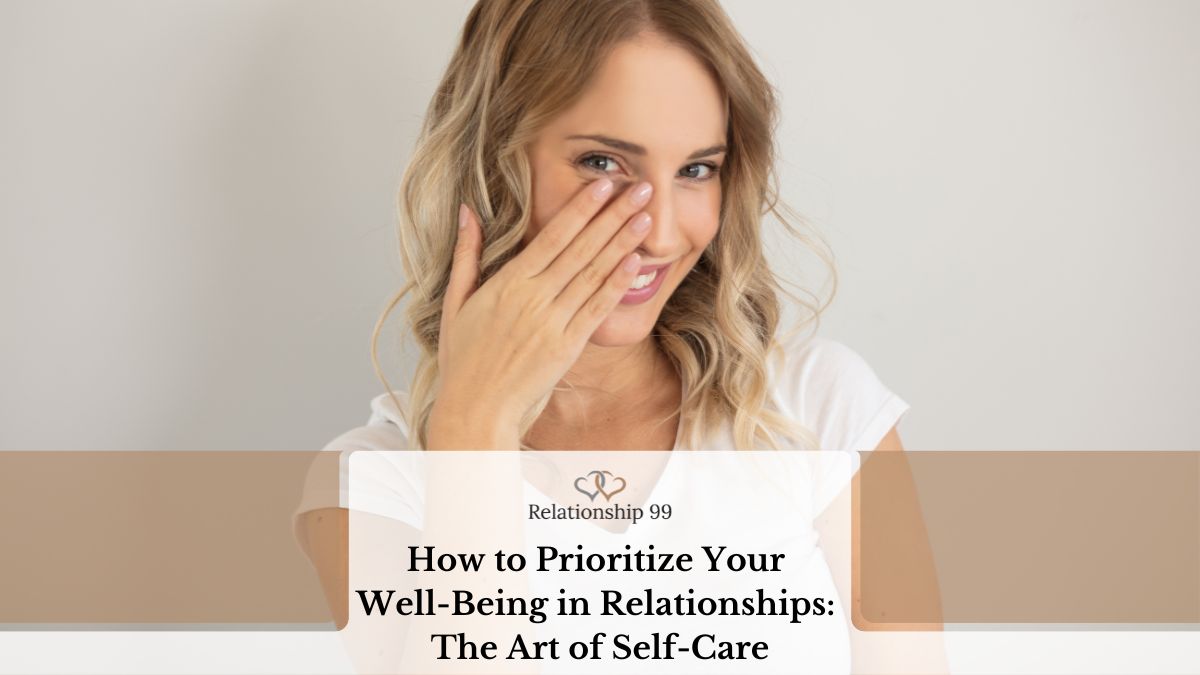We often hear the phrase “self-care” mentioned in various articles, social media posts, or from friends and family. While it may seem like a trendy buzzword, self-care is actually an essential practice for maintaining our physical, mental, and emotional well-being. In today’s fast-paced world, where we are constantly juggling responsibilities and relationships, taking care of ourselves can easily fall to the bottom of our to-do list. However, neglecting our own well-being can have a detrimental impact on our relationship and overall quality of life. In this blog, we will explore the art of self-care in relationships and how prioritizing our well-being can lead to healthier and happier connections with others.
The Importance of Self-Care in Relationships
Self-care is often associated with indulging in activities that bring us joy or relaxation, such as taking a bubble bath, going for a massage, or treating ourselves to our favorite food. While these activities can certainly contribute to our well-being, self-care goes beyond just pampering ourselves. It involves taking intentional actions to meet our physical, emotional, and mental needs in order to maintain balance and prevent burnout.
In the context of relationships, self-care is crucial because it allows us to show up as our best selves, both for ourselves and for our partners. When we neglect our own well-being, we may become irritable, stressed, or overwhelmed, which can negatively impact our relationships. On the other hand, when we prioritize self-care, we are better equipped to handle conflicts and challenges in a healthy way, leading to stronger and more fulfilling connections with others.

Practical Ways to Practice Self-Care in Relationships
Now that we understand the importance of self-care in relationships, let’s explore some practical ways to incorporate it into our daily lives:
1. Set Boundaries
In any relationship, it is essential to set boundaries and communicate them clearly to your partner. This means being honest about your needs and limitations and not compromising on them for the sake of pleasing others. Setting boundaries also means learning to say “no” when necessary without feeling guilty. It includes taking breaks when we need them, whether it’s from work, social events, or even our partner. By setting boundaries, we not only prioritize our own well-being but also show respect for ourselves and our relationships.
2. Engage in Self-Reflection
Self-care also involves self-awareness and understanding our own emotions and needs. Take time to reflect on your thoughts and feelings, and pay attention to any patterns or triggers. This will allow you to better understand yourself and communicate effectively with your partner. Additionally, self-reflection can help identify any negative thoughts or behaviors that may be impacting your relationships, allowing you to work on them and improve the dynamics.
3. Practice Self-Compassion
Being in a relationship can sometimes bring up feelings of insecurity or self-doubt. It’s important to practice self-compassion and be kind to ourselves during these moments. This means treating ourselves with the same kindness and understanding we would show towards a loved one. Instead of criticizing ourselves, we can acknowledge our feelings and offer support and reassurance. You can also practice positive self-talk and remind yourself that you are worthy of love and care.
4. Make Time for Yourself
In the busy and demanding world we live in, it’s easy to neglect our own needs. That’s why it’s important to intentionally make time for ourselves, even if it’s just a few minutes each day. Use this time to engage in activities that bring you joy, whether it’s reading, exercising, or simply relaxing. This will not only recharge your batteries but also help you reconnect with yourself and your own needs.
5. Communicate Openly with Your Partner
Communication is key in any relationship, and it’s no different when it comes to self-care. Be open and honest with your partner about your needs and boundaries. Communicate when you need alone time, support, or simply a listening ear. This will not only strengthen your bond with your partner but also show them that you value and prioritize your well-being.

Tips to Incorporate Self-Care into Your Daily Routine
Start Small: Don’t feel pressured to completely overhaul your routine, and start practicing all forms of self-care at once. Start with small, manageable steps, such as setting aside 15 minutes each day for yourself.
- Find What Works for You: Self-care is personal, and what works for one person may not work for another. Experiment with different activities and find what brings you joy and relaxation.
- Schedule It In: Just like any other important task, schedule self-care into your daily routine or weekly schedule. This will help ensure that it doesn’t get pushed aside for other obligations.
- Practice Mindful Self-Care: Instead of mindlessly scrolling through social media or binge-watching TV, engage in self-care activities mindfully. Pay attention to how it makes you feel and savor the moment.
- Find Support: Surround yourself with people who support and encourage your self-care journey. This could be a friend, family member, or even an online community.
Remember that prioritizing self-care is not selfish; it’s necessary for our overall well-being and the health of our relationships.
What Self-Care is NOT in Relationships?
While self-care is essential for healthy relationships, it’s important to understand what it is not. Self-care should never be an excuse for selfish or harmful behavior towards our partners. It also should not be used as a way to avoid addressing relationship issues or conflicts.
Self-care means taking care of ourselves while still being considerate and respectful towards our partners. It involves finding a balance between meeting our own needs and the needs of the relationship. Additionally, it’s important to communicate with our partners about any self-care practices that may affect them, such as taking alone time or making changes in our routine. This open and honest communication can help prevent misunderstandings or hurt feelings.
Remember that self-care is a continuous process and may look different for each individual and relationship. It’s not about achieving perfection but rather making small intentional actions to prioritize our well-being and strengthen our relationships. So keep an open mind, be patient with yourself and your partner, and continue to prioritize self-care in your relationships.
To Sum It Up
Self-care is crucial in maintaining healthy relationships and overall well-being. It involves setting boundaries, engaging in self-reflection, practicing self-compassion, making time for ourselves, and communicating openly with our partners. However, it’s important to understand what self-care is not and find a balance between meeting our own needs and the needs of the relationship. Remember to be kind and patient with yourself and your partner, and make self-care a continuous practice in your relationships. So go ahead, take care of yourself, and watch your relationships thrive!

